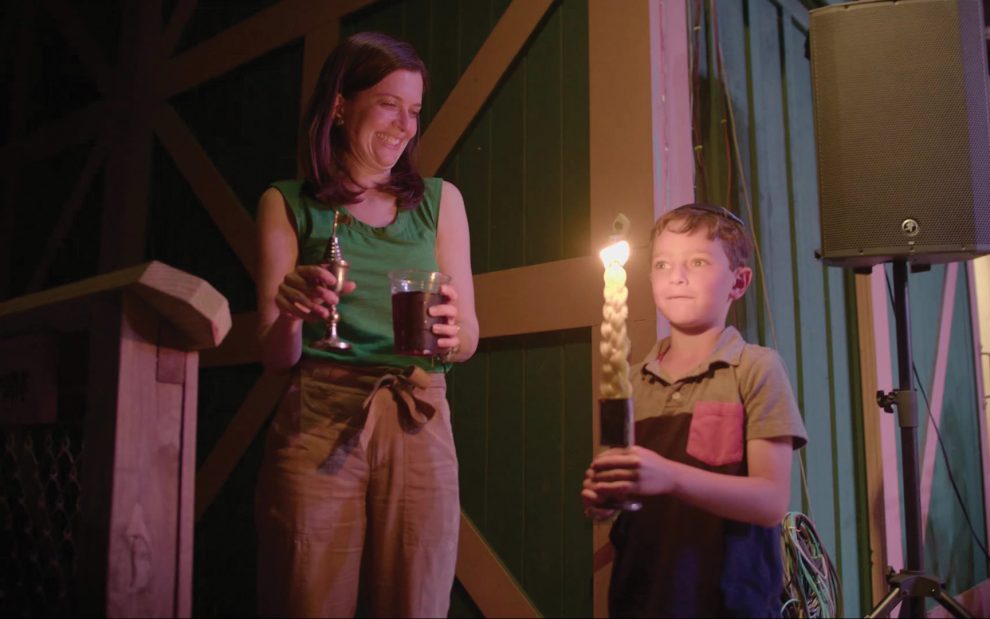In 1848, Karl Marx and Frederick Engels wrote that capitalism, with its “[c]onstant revolutionising of production, uninterrupted disturbance of all social conditions, everlasting uncertainty and agitation,” was creating a world in which “[a]ll fixed, fast-frozen relations, with their train of ancient and venerable prejudices and opinions, are swept away, all new-formed ones become antiquated before they can ossify. All that is solid melts into air, all that is holy is profaned.”
One of the first of those “ancient and venerable” notions to fall before the march of capital was public observance of a Sabbath day on which all economic activity was suspended. A new two-part documentary, titled simply Sabbath and now streaming on pbs.org, makes a compelling case that a revival of the Sabbath is needed in today’s world.
The concept of a Sabbath, of course, originated in ancient Judaism, inspired by the Genesis story in which God created the universe in six days and rested on the seventh. As the documentary tells us, over the centuries this principle grew into a comprehensive body of Sabbath law that includes detailed proscriptions and prescriptions for the weekly observance, which is to be devoted to prayer and religious observances. Sabbath, as envisioned in Judaism is, at its heart, a spiritual practice. It involves setting aside the need to produce, perform, or impress and surrender wholly to our status as creatures. In Sabbath, the great Jewish theologian Abraham Heschel is quoted as saying Sabbath was the only day on which he didn’t need to prove that he was a good rabbi. Heschel’s daughter, Susannah, herself a professor of Jewish studies, is one of the experts interviewed in Sabbath.
The documentary’s most remarkable depictions of Sabbath inevitably come from the Jewish tradition. We see the Sabbath in practice at synagogues; summer camps; a Brooklyn, New York, Hasidic center; and the dinner table of an observant Jewish family. However, Christianity also adopted and adapted Sabbath practices, though moving them to Sunday, the day of Christ’s resurrection. There it lives on in things such as the Catholic requirement to attend Sunday Mass and the catechism’s proclamation that on Sunday the “faithful are to refrain from engaging in work or activities that hinder the worship owed to God.” Sabbath also visits other outposts of Christian Sabbath observance such as the Seventh Day Adventists, a Protestant denomination that observes the Saturday Sabbath.
As the documentary shows us, the Puritans brought an especially rigorous and rigid observation of the Sunday Sabbath to American shores, and in this their cultural influence outlasted their doctrinal dominance. Well into the mid-20th century, laws requiring businesses to close on Sunday were common in the United States. In fact, in one of Sabbath’s most surprising segments, we learn that Bergen County, New Jersey, a New York City suburb, has Sunday closings to this very day. In a 1993 referendum, the county’s residents upheld the Sunday regulation by a 2–1 vote.
However, Bergen County is an outlier. In the rest of the United States most Sunday closing laws were abolished by a combination of business interests and secular liberals, who argued that Sunday closings constituted discrimination against non-Christians.
Throughout the two hours of Sabbath, the word that kept coming into my mind was enough. Observance of Sabbath is a way of saying that there is such a thing as enough—enough of work, enough of social media, enough of shopping, even enough of youth sports. Clearing away the noise and distraction of our daily lives can help us see and hear the presence of God among us.
Sabbath may be personal, but it is never individual. It is an observance that a community does together and one that has clear implications for the making of a just and sustainable social order.
As Rabbi Ammiel Hirsch points out, the weekly day of rest was from its beginning a revolutionary concept. For one thing, it was the first labor-protection law. Historian Thomas Kidd notes that labor unions and churches have often worked together to advocate for days of rest. In addition, Sabbath law also included a sabbath for the land, which was to go untilled every seven years. After 49 years came a Jubilee, with the forgiving of debts, the freeing of slaves, and the return of land to its rightful owners.
Maintaining some kind of Sabbath observance has become especially difficult for many American families in recent generations. Forty years of stagnant wages have forced both parents to work full-time outside the home to maintain a middle-class income. With no one available for household chores Monday to Friday, weekends become a frenzied round of shopping, cooking, cleaning, and home repair.
As a result, many labor advocates, and even a few business leaders, have begun to advocate a four-day work week, with 32 hours of work for no reduction in pay. In the recent United Auto Workers strike, this expansion of the Sabbath concept was one of the UAW’s demands. That brought a lot of eye-rolling from conservative politicians and pundits. But it’s not really that radical. In a recent British experiment, 61 companies of varying types implemented the four-day week for six months. At the end of the trial, 91 percent of the companies opted to continue the change.
The UAW didn’t get the four-day week this time, but the issue is now on the table, and the concept of Sabbath rest lives on.
Sabbath is directed by Martin Doblmeier, whose previous work includes films about Dorothy Day, Abraham Heschel, and Howard Thurman, and is produced by Journey Films, which also offers study guides and other materials for groups that want to use the documentary.
This article also appears in the February 2024 issue of U.S. Catholic (Vol. 89, No. 2, pages 36-37). Click here to subscribe to the magazine.
Image: ©Journey Films














Add comment